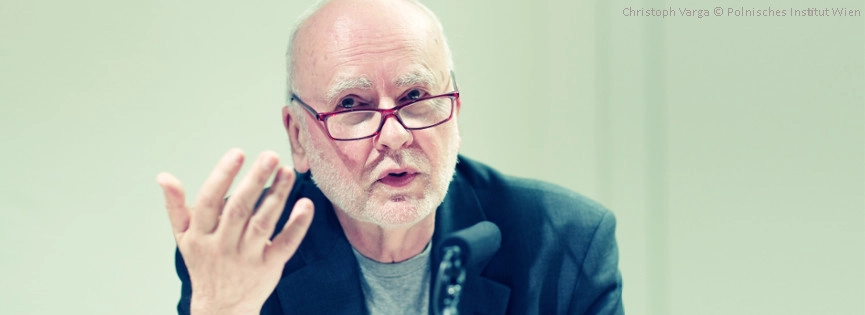Main content
Adam Zagajewski 2017 Princess of Asturias Award for Literature

Adam Zagajewski (born June 1945, in Lwów, now Lviv, Ukraine - Cracovia, Poland, 21st March 2021) was a poet, novelist and essayist who graduated in Philosophy and Psychology from the Jagiellonian University, Krakow. One of the most famous contemporary Polish poets, he is considered one of the Generation of ’68 or New Wave, made up of writers committed to political engagement in their works. Zagajewski created two of the main slogans of this group: Powiedz prawde (Tell the truth) and Mow Wprost (Speak up). Successively exiled in Germany, Paris and the USA, he returned to Krakow in 2002, where he now lives. He is co-editor of the literary magazine Zeszyty literackie, published in Paris, and has been a visiting professor at the University of Houston, a position he currently holds at the University of Chicago.
In the 1970s, he joined the Krakow-based dissident group “Teraz” (Now). He published his first collection of poems, Komunikat, in 1972, which was followed by the novel Ciepło, zimno (Hot and Cold). He also propagated his ideas in the underground literary journal Zapis, one of the principal media of the Polish democratic opposition. He subsequently published Sklepy miesne (The Butcher’s). Persecuted by the communist regime, he was exiled in Paris in 1982 and published the novel Cienka kreska (The Thin Line) and the essay List. Oda do wielosci (A Letter. Ode to Plurality). Zagajewski expounded his thesis on the political commitment of writers in his following essay, Solidarnosc i samotnosc, 1986 (Solidarity, Solitude, 1990). In 1988, he travelled to the USA, where he worked as a visiting professor on the Creative Writing Program at the University of Houston.
In Plótno, 1990 (The Canvas), he evolved towards poetic contemplation, moving away from the protest poetry of his early works. He himself said about this change, “Poetry is somewhere else, beyond immediate partisan struggles, and even beyond rebellion –including the most justified rebellion– against tyranny.” It has been said of him that his resolute stance in defence of freedom and the search for beauty is faithfully reflected in his work, a work of great human depth and fine aesthetic sensibility. The critics have also highlighted the characteristic musicality and luminosity of his literary voice. The recurring themes in his work include the night, dreams, time, eternity, silence and death, as well as “the poetics of life’s imperfection”, as he has put it. For Zagajewski, poetry also has to combine “irony and ecstasy”, while the poet is someone who is “aware of history”.
His later works include the essay Dwa miasta, 1991 (Two Cities, 2002), the collections of poems Ziemia ognista, Trzej aniolowie, 1998 (Three Angels), Pragnienie, 1999 (Desire), Anteny, 2005 (Antenna), Niewidzialna reka, 2009 (Invisible Hand), described as “a wonder”, his memoir W cudzym pieknie, 1998 (Another Beauty, 2002) and the compilation of essays Obrona zarliwosci, 2002 (A Defense of Ardor, 2005). His latest work to be published in Spain is Releer a Rilke, 2017 (Re-reading Rilke).
Among other awards, he holds the Kościelski Foundation Literary Award (1975), the Tucholsky Award (1985), the French PEN Club Freedom Award (1987), the Neustadt International Prize for Literature (2004) and the Griffin Poetry Prize Jury Lifetime Recognition Award (2016). In 1999, he was elected a member of the Berlin Academy of Arts and in 2012 received an honorary degree from the Jagiellonian University, Krakow. He has also received the Bronze Cross of Merit (Poland) and the Official Cross of the Order of Polonia Restituta.
End of main content
